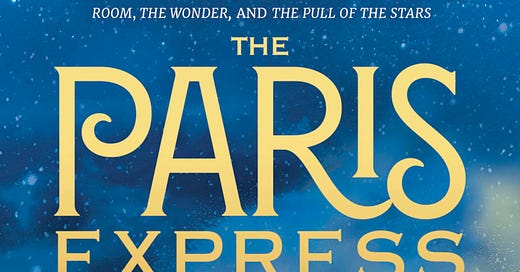One of the beautiful things about Emma Donoghue’s novels is I’m never totally sure what kind of story I’m going to get. But I always know it will be beautifully told and it will probably give me some insight into something I had never thought of before. With The Paris Express, published back in March, I learned about a real train accident as Donoghue imagined what it might have been like for passengers on that unlucky train.
Here’s the book’s description:
Based on an 1895 disaster that went down in history when it was captured in a series of surreal, extraordinary photographs, The Paris Express is a propulsive novel set on a train packed with a fascinating cast of characters who hail from as close as Brittany and as far as Russia, Ireland, Algeria, Pennsylvania, and Cambodia. Members of parliament hurry back to Paris to vote; a medical student suspects a girl may be dying; a secretary tries to convince her boss of the potential of moving pictures; two of the train’s crew build a life away from their wives; a young anarchist makes a terrifying plan, and much more.
I ended up listening to the audiobook of this one, which was wonderfully narrated by Justin Avoth. I think, though, that might have hampered my ability to keep track of all the characters who popped up in this book. So. Many. Characters. For a short book, it took too long to keep them all straight. And I still don’t think I managed. I appreciate that Donoghue wanted to give us a good sampling of people from all parts of society but it was hard to remember who was who and what their backstory was. It was hard to get to know them because there was so much going on and I wasn’t sure I always cared about the little tidbits I got to learn. I’d rather have spent more time with some characters than others, too, which is almost always the case with a large cast of characters.
One interesting thing to think about is that we, the readers, only spent a few hours with these people and then off they went to continue living their lives. Which was, maybe, how the train passengers may have felt. They, unlike the reader (if they read the description or know a lot about train history), don’t know that there will be a disaster. They’re just living their lives. But we know they’re about to be connected for life by whatever is about to befall the train. It was an interesting feeling, let me tell you. Because I didn’t know what exactly was going to happen. Was everyone I met going to die? Only some of them? Was one character going to cause a crash or another kind of accident? Was the disaster caused by nature or man? I almost wished I had known more about this train before I started reading because that may have soothed some of my jangling nerves that meant I may not have enjoyed the story as much as I should have.
While Donoghue is a very talented author (and such a good speaker - if you ever have the chance to see her at an event, take it!), I felt there was a bit too much info-dumping in this book than I typically like to see in historical fiction. It was a little bit like she was making sure I knew that it was 1895 and had to reference all sorts of things so I wouldn’t forget it. Some things were interesting - there was a character who was working in film or photography - but even that got over explained. It was a bit unfortunate.
Overall, I’m glad I read The Paris Express because I’m never mad about reading an Emma Donoghue novel. It’s not one of my favourites by her but historical fiction fans who enjoy a large cast of characters in their books, may enjoy this one.
*An egalley of this novel was provided by the publisher, Simon & Schuster, via Edelweiss in exchange for review consideration. All opinions are honest and my own.*




I haven't read any of Emma Donoghue's novels, and I need to change that. Great review! I'm usually intimidated when there are too many characters. I can understand having a hard time sorting through them.